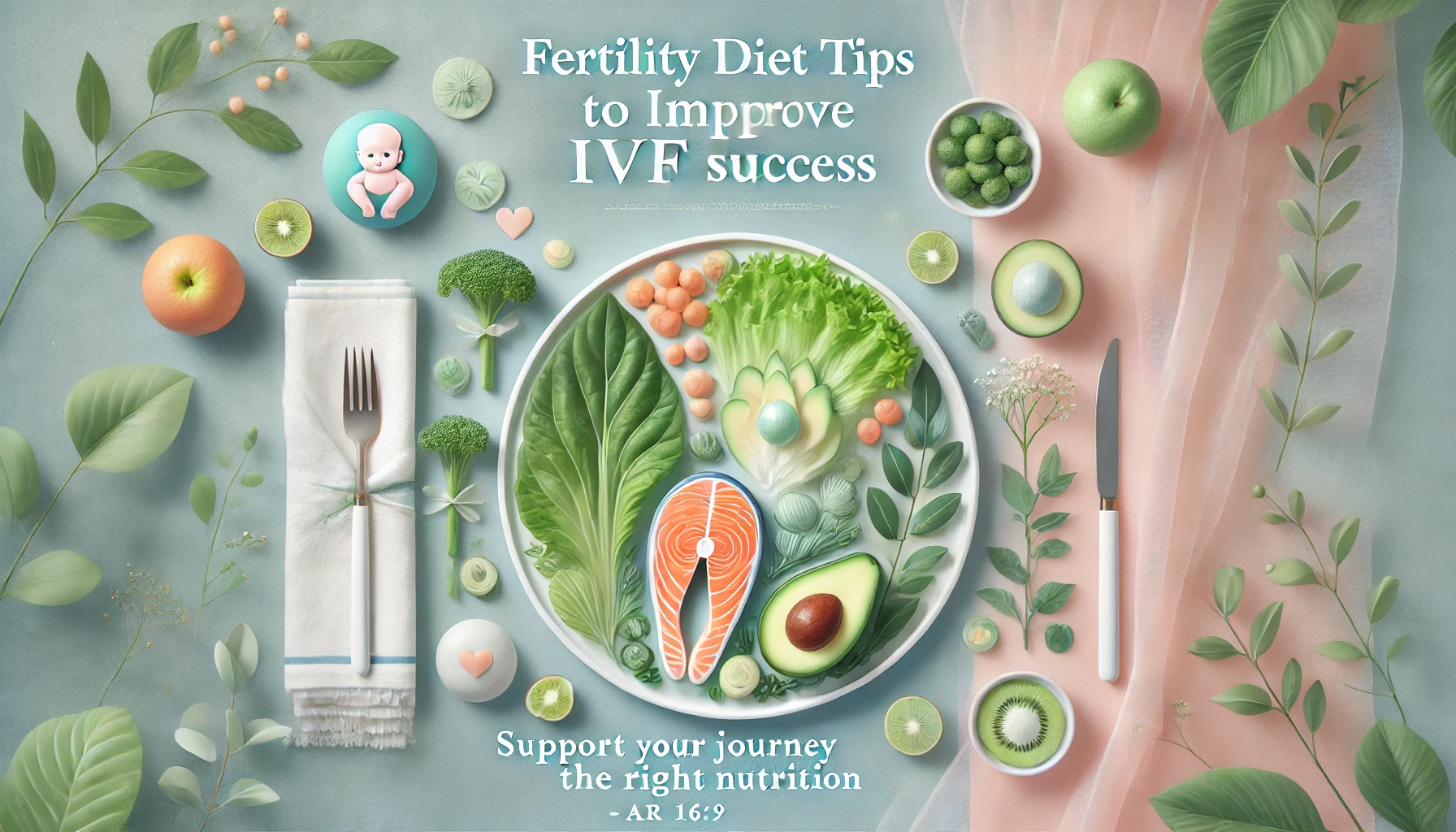Fertility struggles can be challenging, but with proper nutrition, you can enhance your chances of success with in-vitro fertilization (IVF). The foods you eat play a critical role in supporting reproductive health, hormone regulation, and overall well-being. Following specific fertility diet tips can improve the quality of eggs, sperm, and your overall ability to conceive.
This article provides actionable dietary guidance to help improve your IVF success, focusing on nutrient-dense, fertility-friendly foods and key lifestyle changes.
Why Diet Matters for IVF Success
What you eat impacts every system in your body, including your reproductive health. Proper nutrition:
- Regulates Hormones: Certain nutrients help balance hormones required for ovulation and implantation.
- Improves Egg and Sperm Quality: Antioxidant-rich foods reduce oxidative stress and protect reproductive cells.
- Supports Uterine Health: Foods that reduce inflammation improve the chances of implantation.
- Boosts Energy Levels: A healthy diet ensures your body has enough energy to sustain the IVF process.
Top Fertility Diet Tips for IVF Success
1. Load Up on Antioxidant-Rich Foods
Antioxidants like vitamins C, E, and zinc help protect your eggs and sperm from oxidative stress caused by free radicals. Include these foods:
- Berries: Blueberries, strawberries, and raspberries.
- Leafy Greens: Spinach, kale, and Swiss chard.
- Nuts and Seeds: Almonds, walnuts, and sunflower seeds.
2. Incorporate Healthy Fats
Healthy fats regulate hormones and improve the quality of eggs and sperm. Replace trans fats and processed oils with:
- Avocados
- Olive Oil
- Fatty Fish like salmon and mackerel
3. Eat Protein-Rich Foods
Proteins are essential for hormone production and cell repair. Choose lean, high-quality sources such as:
- Eggs
- Legumes: Lentils and chickpeas
- Chicken and Turkey
For vegetarians, plant-based proteins like tofu and tempeh are excellent alternatives.
4. Include Complex Carbohydrates
Swap refined carbs like white bread and sugary cereals for whole grains to maintain stable blood sugar levels, which are critical for hormone balance. Opt for:
- Quinoa
- Oats
- Brown Rice
5. Prioritize Iron-Rich Foods
Low iron levels can affect ovulation. To boost your iron intake, include:
- Lean Red Meat
- Pumpkin Seeds
- Dark Leafy Greens
Pair iron-rich foods with vitamin C-rich options like oranges or bell peppers to enhance absorption.
What to Avoid When Preparing for IVF
Certain foods can negatively impact fertility and should be minimized or avoided:
1. Processed and Sugary Foods
- High sugar intake can cause hormonal imbalances and inflammation. Limit candies, pastries, and sugary drinks.
2. Trans Fats
- Found in fried and packaged foods, trans fats harm cardiovascular and reproductive health.
3. Excess Caffeine and Alcohol
- Both caffeine and alcohol can reduce fertility. Limit caffeine to no more than one cup of coffee daily and avoid alcohol entirely during IVF treatment.
4. Artificial Sweeteners
- Some studies suggest that artificial sweeteners like aspartame may interfere with fertility. Opt for natural sweeteners like honey or maple syrup.
Hydration: The Overlooked Fertility Booster
Staying hydrated is critical during the IVF process. Water supports:
- Uterine Health: Proper hydration ensures the uterine lining is healthy and receptive.
- Nutrient Absorption: Water helps deliver essential nutrients to your reproductive organs.
Tip: Aim for 8–10 glasses of water daily and avoid sugary or artificially flavored drinks.
Lifestyle Changes to Complement Your Fertility Diet
1. Maintain a Healthy Weight
Being overweight or underweight can affect hormone balance and reduce IVF success rates. Combine your fertility diet with regular, moderate exercise like walking or yoga.
2. Manage Stress Levels
High stress can disrupt ovulation and implantation. Practice relaxation techniques such as:
- Meditation
- Deep breathing exercises
- Acupuncture
3. Avoid Smoking and Environmental Toxins
Smoking and exposure to pollutants can damage eggs and sperm. Choose organic produce whenever possible to limit pesticide exposure.
Sample Fertility-Friendly Meal Plan
Here’s an example of a balanced, fertility-focused meal plan to support IVF success:
| Meal | Food Options |
|---|---|
| Breakfast | Avocado toast on whole-grain bread with a boiled egg |
| Snack | Greek yogurt with blueberries and walnuts |
| Lunch | Grilled salmon with quinoa and steamed spinach |
| Snack | Carrot sticks with hummus |
| Dinner | Chicken stir-fry with brown rice and mixed veggies |
FAQs About Fertility Diet Tips for IVF
Yes, a fertility-focused diet improves egg and sperm quality, balances hormones, and creates a supportive environment for implantation.
Focus on antioxidant-rich foods, healthy fats, lean proteins, and whole grains to support reproductive health.
Yes, consult your doctor about taking prenatal vitamins or supplements like folic acid, vitamin D, and omega-3s to complement your diet.
Aim for 8–10 glasses daily to stay hydrated and support uterine health.
Yes, but choose healthy options like salads, grilled proteins, and whole grains. Avoid fried foods and sugary beverages.
Conclusion
The journey to parenthood can be complex, but adopting a fertility-focused diet can make a significant difference. By following these fertility diet tips, you can improve your IVF success rates, enhance reproductive health, and prepare your body for a healthy pregnancy.
Remember, every small step toward better nutrition brings you closer to your goal. Start implementing these tips today and consult a fertility expert to personalize your plan.



